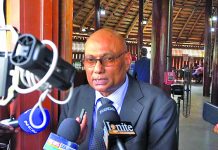…Minister gets ‘sweeping’ power – Ali
After six hours of heated debate, the Government on Monday evening passed the Telecommunications (Amendment) Bill 2016, despite pleas from the Opposition that certain sections of the Bill needed to be reviewed.
“We are taking all the powers and putting it monopolistically in the hands of the Minister…their powers are too much and too great for the Ministers,” Opposition Member of Parliament Irfaan Ali argued, stating that the Bill was moving the monopoly from a company straight into the hands of the Minister. He further stated that the passage of the Bill in its present state would move the country backwards from a “monopolistic position to dictatorship”.
He pointed out that there were errors in the Bill, but they were overlooked. He contended that the “mischief” in the Bill was in plain sight as it related to the Minister’s control in the sector. Therefore, he suggested that the Bill be sent to a special select committee to correct its “deficiencies”.
The much-anticipated Bill was on Monday read for a second time in the House by Public Telecommunications Minister Cathy Hughes, who touted the importance of its passage in developing the country’s economy and standard of living.
After eight speakers and back and forth heckling, the Bill was passed. Hughes, in her presentation, pleaded with the House to recognise the importance of information and communication technology as the transformational agent for the overall improvement of citizens’ lives and the building of a 21st Century economy.
“Critical to this improvement is the creation of a telecommunication sector that is competitive and flexible enough to need a modern rapidly evolving technological environment. This transition is long overdue,” she insisted, adding that the sector should be an open one in order for Guyana to progress in the area of service provision and delivery and not lag behind other Caricom countries and most of the rest of the world.
She said the landmark legislation would provide for an open, competitive telecommunications sector where new market entrants and investors would be attracted to invest in the country.
The Minister stated that consumers would be given more choice and access to reliable and advanced telecommunications services. “The intention is clearly to be an Act to provide for the establishment of the telecommunication agency and for a regular, coordinated, open and competitive telecommunication sector.” “Any suggestion that there has been no consultation on this Bill is clearly inaccurate. This Bill is the work of both sides of the House and we should be proud that we were able to work together to come up with such an excellent piece of legislation.
“This Bill is a very important one. Guyana cannot waste any more time lagging when it comes to information communication technology. It is one that is awaited with much anticipation by all Guyanese. It will guarantee that we get better service…”
In crushing the monopoly and levelling the playing field, Hughes stated that much effort was placed into the design of the legislation to ensure that it was effective and could be implemented as early as possible. She insisted that it was enshrined with transparency and non-discrimination in the issuance of licences and frequency authorisation, adding that the Bill provides for regulation to ensure that consumers receive good quality service. The Bill comprises 14 parts with 95 clauses.
GTT, which has claimed a legal monopoly on international voice and data transmissions and the domestic wireline service, has always declared that the sector was free because of the existence of other service providers. However, Digicel, its giant competitor, has lambasted the company for its statement.
Member of Parliament Odinga Lumumba who described the monopoly as a noose around the necks of Guyanese, stated that when GT&T took over the sector, it became a “cash cow” and instead of building a national cable network and advancing the sector, the company’s only interest was maximising profits.
He stated that from his research, the passage of the legislation would enable better landline services, lower-cost landline and mobile service, more dynamic Internet service and new job opportunities. Stating that the population was dealt a bad hand by the monopoly, Lumumba declared that now was the time to break it and create an open market.
Minister of State, Joseph Harmon, during his presentation, gave his full support to the passage of the Bill, citing that the issues that have risen in the debate were void.
He urged Ali to reconsider his statement that the piece of legislation should be sent to a select committee and instead “let us do what we have to do and pass the Bill”.
Citing the experience and knowledge the committee leaned on, Harmon announced that he felt proud of the work of the committee and to stand and represent the Bill in the House.
He stated that there have been extensive consultations on the legislation and the time has come for its passage. He went as far back as to mention that former Prime Minister Samuel Hinds had called for the passage of the Bill.
Harmon stated that the Bill would have been passed if not for the prorogation of the Parliament.
In November 2013, the National Assembly sent the legislation to a special select committee with the then Opposition indicating that while it supported the Bill, it was uneasy over the then Minister’s control.
The Bill was pushed back several times and the two communications giants in Guyana were in discussions to break the monopoly held by GTT.
PPP/C Chief Whip Gail Teixeira, who moved a motion for the Bill to be sent to a special select committee, stated that it was the Government’s responsibility to fix the sector. “We failed, you fix it. We are not in government, hon, you have to get the fibre-optical cable,” she said, minutes before her motion was shot down and the Bill passed.











